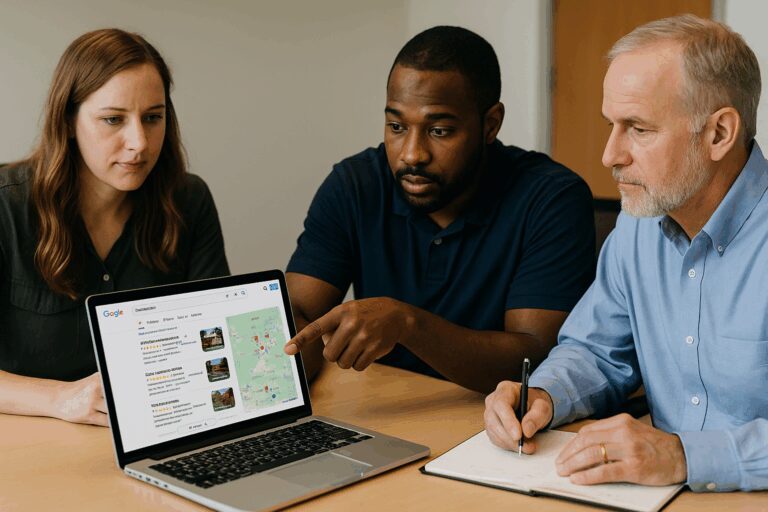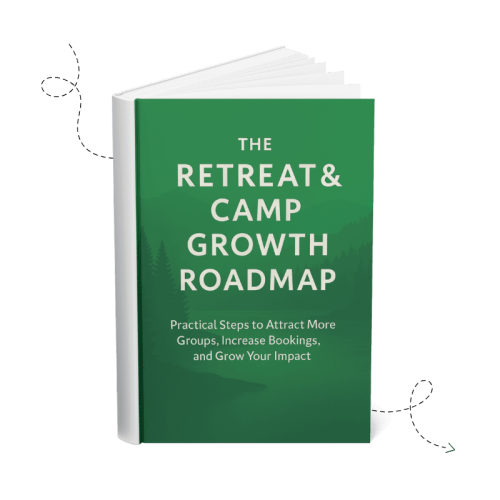Retreat & Camp Growth Roadmap Step 3: Establish Your Presence
Introduction
Once your website is live and ready to receive inquiries, the next critical step is making sure people can actually find you. Many Christian retreat centers and camps struggle with visibility. Even with a beautiful facility and a well-run ministry, new guest groups can’t book a retreat if they don’t know you exist. Step 3 of the Retreat & Camp Growth Roadmap helps you establish your presence across key online platforms so that the right people can discover and trust you.
In this article, we’ll explore what it means to “Establish Your Presence,” why it matters, and how to apply each of its three supporting focus areas. We’ll also link to in-depth guides that walk you through each area in detail.
Why Establishing Your Presence Matters
When churches, ministries, or event planners begin searching for retreat venues, their first step is almost always a Google search. If your camp or retreat center doesn’t appear prominently in those results—or if your listings are outdated or inconsistent—you may never even get considered.
Establishing your presence isn’t about shouting louder. It’s about showing up consistently in the right places, with the right message, at the right time. This step supports your mission by:
- Making your ministry discoverable by those actively seeking a venue like yours.
- Building trust through consistency across search engines, directories, and reviews.
- Supporting good stewardship by maximizing the return on the platform you’ve already built.
Is This a Focus Area You Need to Work On Now?
Consider the following questions:
- Can new guest groups easily find your retreat center when they search online?
- Is your Google Business Profile complete, accurate, and updated regularly?
- Are you listed on a variety of national, local, and faith-based directories?
- Do your online listings show consistent contact info, descriptions, and branding?
- Is your website optimized for local keywords and locations?
- Are you actively collecting and responding to online reviews?
If you answered “no” to any of these, this step can help you bring greater visibility, trust, and impact to your ministry.
Putting This Step into Practice
This step includes three practical focus areas, each designed to increase your visibility, credibility, and trust with planners actively searching for a retreat venue. You don’t need to be a marketing expert to make progress—just take one action at a time and build from there.
Focus Area #1: Enhance Your Google Listing
Goal: Make a great first impression where most planners begin.
Your Google Business Profile is often the first thing people see when they search for your retreat center. It appears in map results, local search panels, and sometimes even before your website. To make the most of it:
- Claim and verify your profile.
- Ensure your contact info, hours, and categories are accurate.
- Add engaging descriptions and high-quality photos.
- Post weekly updates about availability or events.
- Respond thoughtfully to every review.
When kept active and accurate, your Google Business Profile becomes a reliable digital welcome desk—often the first interaction a potential guest group has with your ministry. It gives them a quick way to learn who you are, see where you’re located, read reviews, and even take action like calling or visiting your website. If you’re unsure how to get started or want to make sure you’re doing it well, our detailed guide walks through exactly how to claim, optimize, and manage your profile effectively.
📖 Read: Stand Out on Google Maps
Mastering your Google Business Profile is the cornerstone of online visibility. It lays the groundwork for the additional listings and optimization strategies that follow in this step. With your primary listing in place, you’re ready to multiply your reach through a broader directory strategy.
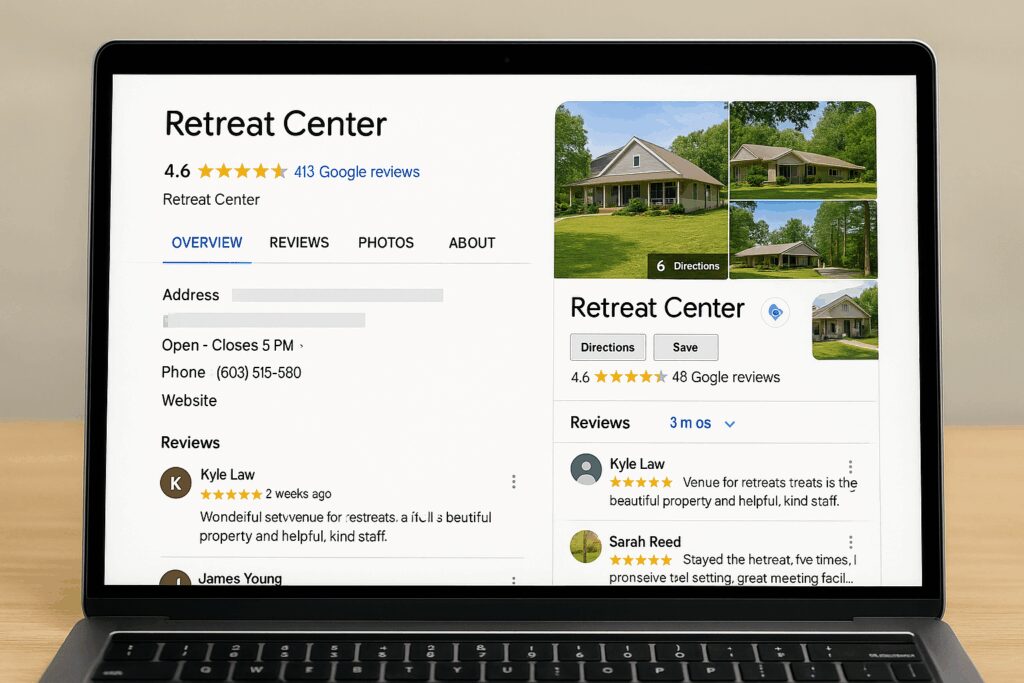
Focus Area #2: Expand Directory Listings
Goal: Multiply your presence across trusted directories.
Your retreat center should appear in more places than just Google. Local business directories, faith-based event planning platforms, national camping associations, and even tourism sites can all serve as referral channels.
To expand your listings:
- Audit where you’re already listed.
- Add your info to new platforms aligned with your niche.
- Use consistent NAP (name, address, phone) details everywhere.
- Monitor and update listings annually to avoid outdated info.
A broad, consistent presence builds credibility and makes you easier to find. Each listing you manage—whether it’s on a Christian camp directory, a tourism website, or a local business platform—serves as another breadcrumb that leads planners to your ministry. Keeping your listings accurate and consistent not only reinforces your legitimacy, but also strengthens your search visibility. For a step-by-step approach to identifying, optimizing, and maintaining these listings, check out our in-depth guide.
📖 Read: Get Found in More Places
Taken together, these listings expand your digital footprint and help your ministry show up wherever planners might be searching. As you build momentum with directory listings, the next natural step is to strengthen your visibility through local SEO.
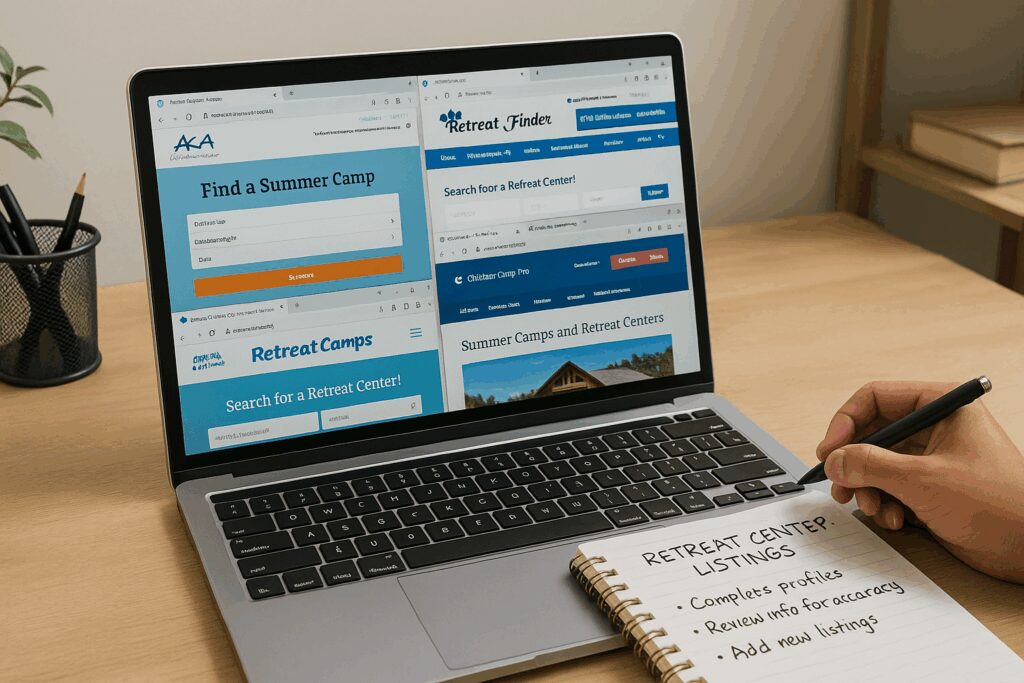
Focus Area #3: Start Local SEO
Goal: Improve your rankings when people search nearby.
Local SEO helps your retreat center rank higher when people search for venues in your area. It’s one of the most cost-effective ways to reach planners who are already looking.
Key actions include:
- Optimizing your homepage and group pages with local keywords.
- Creating city- or region-specific service pages.
- Embedding your Google Map and reviews on your website.
- Publishing locally relevant blog content.
- Geotagging images and writing location-rich alt text.
When your site speaks clearly about who you are and where you serve, search engines—and people—take notice. This clarity and relevance are the heart of effective local SEO. By aligning your content, structure, and messaging with the needs of nearby planners, your site can rise in search rankings and stand out as a trustworthy, local option. For a practical breakdown of how to put this into action, including real-world examples and step-by-step strategies, be sure to check out our full guide.
📖 Read: Get Found in Your Own Backyard
When you combine a strong Google presence with consistent directory listings, local SEO helps tie everything together by making your website a magnet for nearby searchers. Whether you’re in a small town or a larger region, optimizing for your geographic reach ensures you appear where it matters most. This final focus area brings your online visibility full circle and sets you up for sustainable, long-term growth.
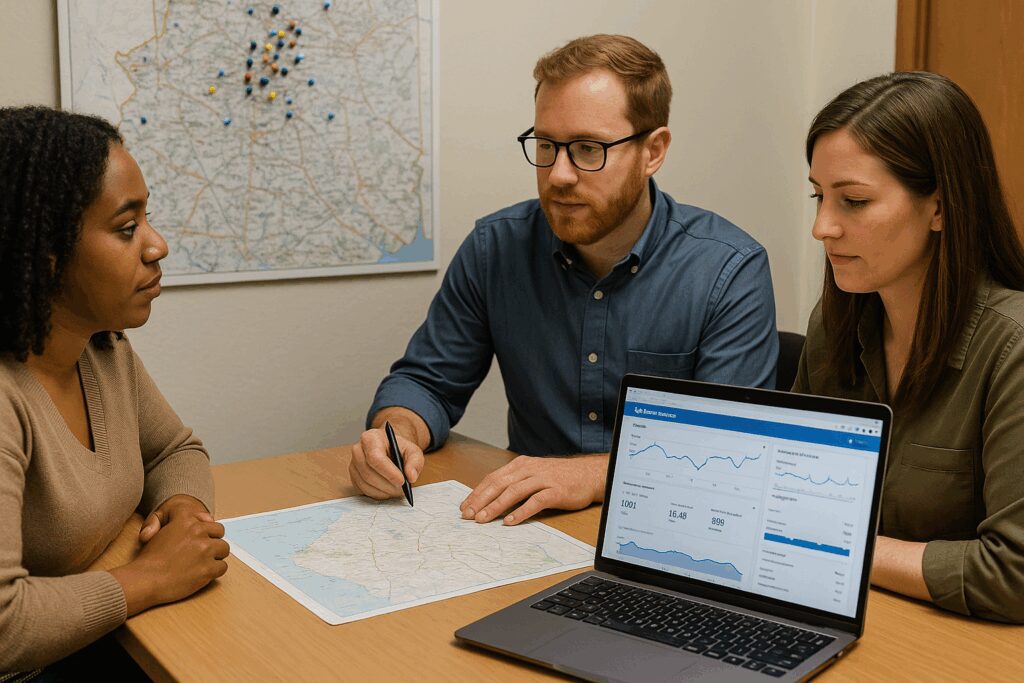
Pulling It All Together
If your website is your digital front door, your online presence is the map that helps people find it. Establishing your presence through Google, directories, and local SEO ensures that when the right group goes looking, they’ll see your ministry as a trustworthy option.
Here are a few action steps you can start with:
- Choose one platform (Google, Yelp, etc.) to review and update this week.
- Set a recurring calendar reminder to check your listings every quarter.
- Identify 2–3 new directories where your retreat center could be listed.
- Assign someone on your team to ask for one new review after each retreat.
- Review your homepage and location pages for clarity and use of local keywords.
- Embed a Google Map on your contact or directions page if you haven’t already.
Don’t feel pressure to do everything at once. Even small, consistent efforts—like updating your Google profile monthly or adding your info to one new directory—can have lasting impact.
Mini Case Study
Williamsburg Christian Retreat Center (WCRC): Building Local Visibility Through SEO
WCRC wanted to expand its reach and attract more guest groups to its facility in Virginia. After establishing a strong website and optimizing their Google listing, they turned their focus to local SEO. By improving the content on key landing pages, incorporating regional keywords, and building a healthy volume of positive reviews, they began climbing the search rankings in their area.
As a result, WCRC now consistently ranks on the first page of Google for key local searches and receives more organic traffic from group planners searching for retreat venues in their region.
Practical Takeaways
If you’re looking for clear, simple next steps, this list will help you move from learning to doing. These actions are realistic for small teams and can make a noticeable difference in how often your center is found online.
- Claim and optimize your Google Business Profile.
- Review and update all existing directory listings.
- Add your center to new relevant directories.
- Optimize your website content for local keywords.
- Collect and respond to reviews regularly.
- Embed maps and location signals across your website.
- Track your progress monthly through Google tools.
Even small improvements in these areas can compound over time to boost your reach and increase inquiries. Prioritize what’s most accessible to you right now, and build from there.
Ready to Take the Next Step?
Establishing your online presence doesn’t have to be overwhelming. Start by taking one step at a time, and you’ll begin to see more guest groups finding and trusting your ministry.
If you found this helpful, here are four great next steps to continue your journey:
🧭 Move to the Next Step: Capture High-Intent Leads
Turn visibility into inquiries with landing pages and targeted search campaigns.
[Read the Capture High Intent Leads Article]
📘 Download the Retreat & Camp Growth Roadmap eBook
Get the full 3-stage system we use to help retreat centers and camps grow with clarity and purpose.
[Download the eBook]
🌱 Learn More About How We Help Retreat Centers & Camps
We’re a Christian-owned digital marketing agency that helps retreat centers and camps grow attendance, bookings, and impact through practical strategies rooted in clarity and stewardship.
[See How We Can Help]
🤝 Schedule a Free Discovery Call
Want help applying this to your unique situation? Let’s talk. We’ll explore where you are now, where you want to go, and how to take the next faithful step.
[Book a Discovery Call]
You don’t have to figure this out alone. Let’s build something meaningful—together.
Frequently Asked Questions
- What’s the difference between a Google Business Profile and a directory listing?
A Google Business Profile is a specialized listing within Google’s ecosystem that influences search and map results. Directory listings appear on other websites and platforms. Both contribute to your visibility and credibility. - How do I know which directories are worth being on?
Start with well-known platforms (e.g., Yelp, Facebook, TripAdvisor) and then look for niche-specific directories for camps, retreats, or ministries. Local tourism boards and Christian event networks are great additions. - Does my location really matter if we serve groups from multiple states?
Yes. Even if your reach is wide, most searchers look locally first. Optimizing for your region increases your chances of being found. - How do I get more Google reviews without feeling awkward asking?
Ask at natural moments—after a successful event or in a follow-up email. Make it easy with a direct link. Express why their feedback matters. - What if our location doesn’t show up correctly on Google Maps?
Claim your listing and use Google’s support tools to request updates. If necessary, submit a support ticket with corrected location info. - Do we need a separate SEO agency for local SEO?
Not necessarily. Many steps can be done in-house with the right guidance and tools. But if you’re short on time or experience, partnering with an expert can accelerate your results. And with the right partner, you can see returns that greatly exceed your own efforts. - How often should I update our listings?
Review and update your Google Business Profile monthly, all others should be reviewed at least annually. Seasonal changes, new programs, or updated hours should be reflected promptly. - How do I track if these efforts are actually working?
Use Google Business Profile Insights, Google Analytics, and Google Search Console. These tools show traffic sources, actions taken, and keyword rankings. - What’s the best place to start if we’re overwhelmed?
Start with your Google Business Profile. It’s free, highly visible, and often the highest-impact action you can take.

